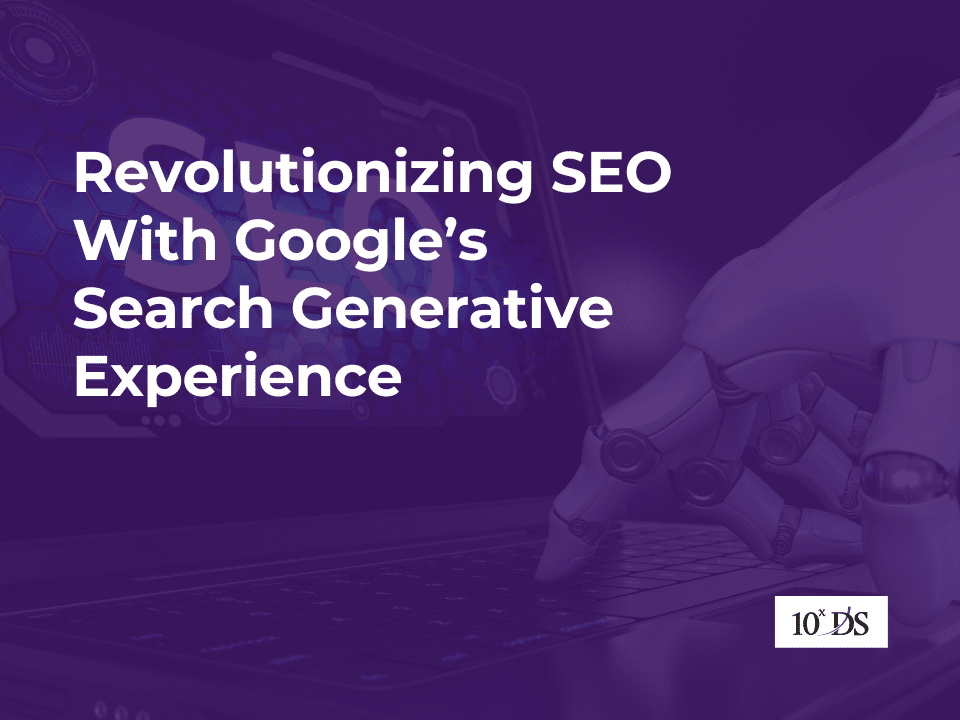
Revolutionizing SEO With Google’s Search Generative Experience
Google’s Search Generative Experience (SGE) marks a significant leap forward in how we search for information online. It’s changing the game for businesses and SEO professionals alike. Let’s break down what Google’s SGE means for SEO and how it’s reshaping the way we approach online search.
What is Google SGE?
Imagine you’re planning a trip to Italy and want to learn more about the local cuisine. In the past, you might have searched for something like “Italian food” and sifted through pages of search results to find relevant information. But with Google’s Search Generative Experience (SGE), the process is much more intuitive and conversational. Instead of typing in a broad query, you can now ask Google specific questions, like “What are the must-try dishes in Italy?” or “How do I make authentic Italian pasta?”
Google’s AI-powered search algorithms understand the context of your queries and provide tailored responses that feel like having a conversation with a knowledgeable friend. You can explore topics in-depth, ask follow-up questions, and get comprehensive answers without ever leaving the search results page.
For businesses, this shift in search behavior has profound implications for SEO. Instead of simply optimizing for keywords, businesses need to focus on creating content that answers users’ questions directly and provides real value. For example, a restaurant in Italy might create blog posts or videos showcasing their authentic pasta recipes or offering tips on where to find the best gelato in Florence.
By adapting their SEO strategies to align with the conversational nature of Google SGE, businesses can ensure that they stay visible and relevant in search results, ultimately attracting more qualified leads and driving meaningful engagement with their target audience.
How SGE Impacts SEO
SEO professionals need to rethink their strategies in light of SGE. Keywords are still important, but now, it’s about understanding user intent and delivering content that matches what people are looking for. Unlike traditional keyword-centric SEO, where the goal was to rank for specific terms, SGE prioritizes delivering relevant and valuable information to users. This means that SEO professionals need to prioritize quality over quantity when creating content. Rather than churning out generic articles stuffed with keywords, businesses must focus on producing high-quality, comprehensive content that addresses the needs and interests of their target audience.
For example, let’s consider a website that sells outdoor gear. In the past, their SEO strategy might have revolved around targeting broad keywords like “hiking boots” or “camping equipment.” However, with SGE, they need to dig deeper and understand the specific questions and concerns their audience has. This might involve creating content such as “The Ultimate Guide to Choosing Hiking Boots” or “10 Essential Camping Gear Items for Beginners.”
Pros and Cons of SGE
SGE brings both opportunities and challenges for businesses. On the one hand, it can lead to fewer clicks on organic search results since users can get answers directly from Google. On the other hand, businesses have a chance to attract more qualified leads who are ready to engage with their content.
| Opportunities | Challenges |
| More qualified leads: Users engaging with AI-generated summaries are likely to be more informed and ready to engage with businesses’ content, leading to higher conversion rates. | Fewer clicks on organic search results: Users may find the information they need directly in the search results, reducing the likelihood of clicking through to websites. |
| Enhanced visibility: Businesses that optimize their content for conversational search queries can improve their visibility in AI-generated search results, reaching a broader audience | Adaptation required: Adapting to the new search landscape may require significant changes to SEO strategies and content creation processes |
| Improved user experience: SGE provides users with quick, relevant answers to their queries, enhancing their overall search experience. | Increased competition: As more businesses optimize their content for SGE, competition for visibility in AI-generated search results may intensify |
Optimizing for SGE Success
To succeed in the age of SGE, businesses must optimize their content for conversational search queries and focus on delivering comprehensive, authoritative information. This means creating content that answers common questions in your industry and providing valuable insights that users can’t find elsewhere.
The Future of Search
Google is still in the process of refining SGE based on user feedback and usage data. As SGE evolves, it has the potential to become a more integral part of Google’s search experience, shaping the future of online search and SEO practices. Businesses must stay adaptable and proactive in their SEO efforts. By staying informed about the latest developments and adapting their strategies accordingly, businesses can stay ahead of the curve and maintain their visibility in an ever-changing search landscape. Google’s Search Generative Experience is revolutionizing the way we search for information online. By understanding its impact on SEO and adapting their strategies accordingly, businesses can position themselves for success in the digital age.
Talk to our experts to learn more


